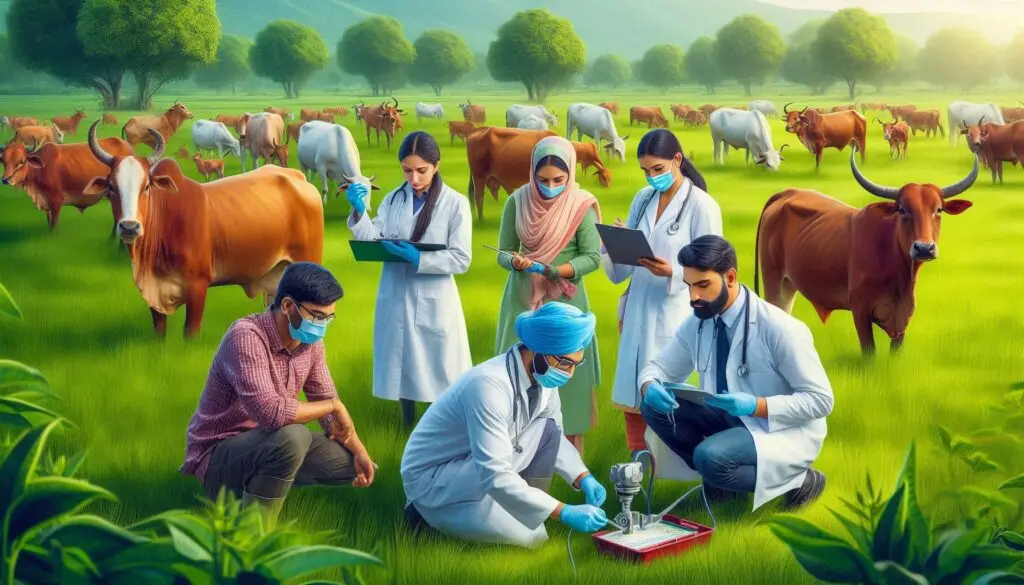Maternal Antibodies and Vaccine Interference in Animals

Understanding Maternal Antibody Interference in Vaccination
Newborn animals receive maternal antibodies through the placenta or colostrum. These antibodies protect them from diseases early in life. However, they can also block vaccine responses, leading to immunization failure. This issue is common in young livestock, pets, and wildlife.
Maternal antibodies recognize and neutralize vaccine antigens before the young animal’s immune system can respond. This prevents the development of long-term immunity.
To understand this interference, researchers have studied various species. Studies show that maternal antibodies can persist for different durations in different animals. Read more about passive immunity here.
How Maternal Antibodies Interfere with Vaccines
Mechanisms of Interference
- Neutralization of the Vaccine: Maternal antibodies bind to the vaccine antigens, making them ineffective.
- Incomplete Immune Response: The newborn’s immune system does not get stimulated due to maternal antibody presence.
- Variability in Antibody Duration: Some species retain maternal antibodies longer than others, delaying effective vaccination.
Young animals may appear protected, but once maternal antibodies wane, they become vulnerable to infections. Learn more about maternal immunity here.
When Do Maternal Antibodies Wane?
The duration of maternal antibodies depends on species, breed, and colostrum quality. Here’s an approximate timeline:
- Dogs & Cats: 8-12 weeks
- Cattle & Horses: 12-16 weeks
- Pigs: 6-8 weeks
- Sheep & Goats: 6-12 weeks
Vaccination schedules are adjusted based on these timelines to minimize interference. Check out vaccination schedules here.
Strategies to Overcome Maternal Antibody Interference
Optimizing Vaccination Timing
Vaccinating too early can lead to neutralization by maternal antibodies. Delaying too long can leave the young animal unprotected.
- Early Vaccination with Boosters: Initial doses may not be effective, but booster shots help once maternal antibodies decline.
- Serological Testing: Testing antibody levels can help determine the best vaccination time. Learn about serology testing here.
Using High-Potency Vaccines
Modified Live Vaccines (MLV): These vaccines are more likely to stimulate the immune system despite maternal antibodies.
High-Antigen Load Vaccines: Some vaccines are formulated to contain more antigens, helping bypass interference.
Recombinant Vaccines: These vaccines use genetic technology to create stronger immune responses.
Key Point: Some studies suggest that MLVs can trigger immunity in young animals even when maternal antibodies are present. Read more here.
Practical Approaches for Farmers & Veterinarians
Best Practices for Vaccination
- Follow a Proper Vaccination Schedule: Work with veterinarians to tailor vaccines based on the species and maternal antibody levels.
- Use Combination Vaccines: Some vaccines provide broader protection while overcoming interference.
- Monitor Immunity Levels: Blood tests can determine if vaccinations are working.
Field Challenges & Solutions
Challenge: Farmers vaccinate too early, leading to vaccine failure.
Solution: Follow proper vaccination schedules and administer boosters.
Challenge: Some vaccines don’t work against maternal antibodies.
Solution: Use high-potency or MLV vaccines.
Challenge: Uncertainty about maternal antibody duration.
Solution: Serological testing can provide insights.
More guidance for veterinarians here: Explore more on veterinary immunization here.
Conclusion
Maternal antibodies protect newborns but can interfere with vaccines, leading to immunization failure. Understanding the duration of maternal antibodies and using the right vaccination strategies is crucial. Farmers and veterinarians must follow optimal schedules, use high-potency vaccines, and monitor immunity levels. By overcoming maternal antibody interference, we can ensure better disease prevention and healthier livestock and pets.
For more pearls of Vets Wisdom:
Breeding Value in Dairy Animals






Responses